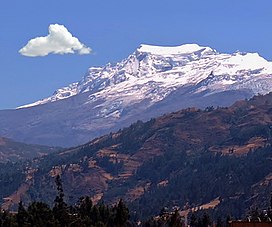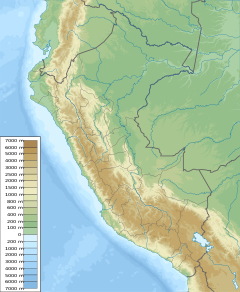Hualcán
| Hualcán | |
|---|---|
| Rajopaquinan | |
 | |
| Highest point | |
| Elevation | 6,165 m (20,226 ft) |
| Prominence | 2,912 m (9,554 ft)[1] |
| Parent peak | Huascaran |
| Coordinates | 9°12′09.89″S 077°31′08.75″W / 9.2027472°S 77.5190972°W |
| Geography | |
| Location | Ancash, Peru |
| Parent range | Andes, Cordillera Blanca |
| Climbing | |
| First ascent | August 1939 via South Ridge by Karl Schmid and Siegfried Rohrer (Germany)[2][3] S. flank-1979.[4] |
Hualcán[5][6][7] (also called Rajopaquinan) (possibly from Quechua wallqa, walqa,[8][9] -n a suffix) is a mountain in the Cordillera Blanca in the Andes of Peru, about 6,165 metres (20,226 ft) high.[5][6] It is located in Ancash, between Chacas (in Asunción Province) and Carhuaz (Carhuaz Province) districts.[10] Hualcán lies south-east of Chequiaraju.[11] Its territory is within the Peruvian protection area of Huascarán National Park and it's on the border of two provinces: Asuncion and Carhuaz. Cities of Chacas and Carhuaz.[12]
First Ascent
[edit]Hualcan was first climbed by Karl Schmid and Siegfried Rohrer (Germany) in August 1939.[2][3]
Elevation
[edit]Other data from available digital elevation models: SRTM yields 6157 metres[13] and ASTER 6157 metres.[14] The height of the nearest key col is 3253 meters, leading to a topographic prominence of 2912 meters.[15] Hualcan is considered a Mountain Sub-System according to the Dominance System [16] and its dominance is 47.23%. Its parent peak is Huascaran Sur and the Topographic isolation is 13 kilometers.[15]
External links
[edit]References
[edit]- ^ "Hualcan / Rajopaquinan". Andes Specialists. Retrieved 2020-04-12.
- ^ a b Deutsch-Österreichische Alpenvereins expeditionen in den Peruanischen Anden.
- ^ a b "AAJ (American Alpine Journal)". AAJ (American Alpine Journal): 157. 1941.
- ^ Neate, Jill (1994). Mountaineering in the Andes. RGS-IBG Expedition Advisory Centre, 2nd edition
- ^ a b Biggar, John (2005). The Andes: A Guide for Climbers. Andes. p. 77. ISBN 9780953608720.
- ^ a b Peru 1:100 000, Carhuás (19-h). IGN (Instituto Geográfico Nacional - Perú).
- ^ Alpenvereinskarte 0/3a. Cordillera Blanca Nord (Peru). 1:100 000. Oesterreichischer Alpenverein. 2005. ISBN 3-928777-57-2.
- ^ Teofilo Laime Ajacopa, Diccionario Bilingüe Iskay simipi yuyayk'ancha, La Paz, 2007 (Quechua-Spanish dictionary): wallqa - s. Collar. Adorno que se lleva alrededor del cuello.
- ^ Diccionario Quechua - Español - Quechua, Academía Mayor de la Lengua Quechua, Gobierno Regional Cusco, Cusco 2005: walqa - s. Collar, collarín. || Colgandijo de oro y piedras preciosas, como la turquesa y otros, usado por la nobleza inka. || Bolsa colgante al hombro. SINÓN: wallqha, walqha. Bol: Sarta de cuentas, collar o cadena. Ec: wallka.
- ^ escale.minedu.gob.pe - UGEL Map of the Asunción Province (Ancash Region)
- ^ Biggar, John (2020). The Andes a guide for climbers (5th ed.). Castle Douglas, Scotland. ISBN 978-0-9536087-7-5. OCLC 1260820889.
{{cite book}}: CS1 maint: location missing publisher (link) - ^ PERU, Autor: GEO GPS. "Base de datos Perú - Shapefile - *.shp - MINAM - IGN - Límites Políticos". Retrieved 2020-04-30.
- ^ USGS, EROS Archive. "USGS EROS Archive - Digital Elevation - SRTM Coverage Maps". Retrieved 12 April 2020.
- ^ "ASTER GDEM Project". ssl.jspacesystems.or.jp. Retrieved 2020-04-14.
- ^ a b "Hualcan / Rajopaquinan". Andes Specialists. Retrieved 2020-04-12.
- ^ "Dominance - Page 2". www.8000ers.com. Retrieved 2020-04-12.

